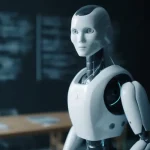The rise of artificial intelligence (AI) has sparked concerns about job displacement due to its increasing role in automating various tasks across industries. While AI offers substantial benefits in terms of efficiency and productivity, it also brings the challenge of transforming the job market. In this blog post, we’ll explore how AI is changing industries, the jobs most vulnerable to automation, and how businesses and workers can adapt to this technological shift.
The Transformative Power of AI
Artificial intelligence is revolutionizing how we interact with technology in our daily lives. From self-driving cars to personalized digital experiences, AI is transforming multiple sectors, including healthcare, business, finance, and transportation. Here’s how AI is reshaping industries:
- Increased Efficiency: AI automates repetitive tasks, allowing employees to focus on more creative and complex responsibilities. It saves time, reduces human error, and helps businesses allocate resources more efficiently.
- Better Decision-Making: AI can analyze large volumes of data and provide valuable insights, helping businesses make more informed decisions and stay ahead of the competition.
- Personalized Experiences: With machine learning, AI tailors recommendations and content to individual preferences, enhancing customer experiences and improving business outcomes.
- Improved Predictions: AI’s data analysis capabilities allow companies to predict trends and market changes, aiding in strategic decision-making and forecasting.
- Enhanced Accessibility: AI has made many tasks easier and more accessible, particularly for those with disabilities, significantly improving quality of life.
- Cost Reduction: By automating processes and reducing the need for manual labor, AI helps lower operational costs for businesses, which can lead to lower prices for consumers and increased competitiveness.
These advancements are just the beginning. As AI continues to evolve, it will unlock even more innovations across industries.
AI’s Impact on the Job Market
AI’s rapid expansion raises concerns about job losses, with certain roles at high risk of automation. According to a report from McKinsey, AI could automate up to 30% of jobs by 2030, which will likely lead to considerable workforce displacement. Let’s take a look at some of the jobs most affected by AI:
- Data Entry Jobs: AI’s ability to process and analyze large data sets has made manual data entry largely obsolete. AI systems can automate data extraction, reducing human error and increasing operational efficiency.
- Telemarketers: The rise of AI-powered virtual assistants and chatbots means that telemarketers are at risk of losing their jobs. These AI systems can handle calls, respond to customer queries, and even make sales pitches.
- Factory Workers: Automation in manufacturing, powered by AI robots, has reduced the need for manual labor on production lines. Robots can perform repetitive tasks more efficiently, increasing productivity while reducing labor costs.
- Travel Agents: AI-driven chatbots can now assist customers with travel bookings, provide information, and answer queries, which threatens the need for traditional travel agents.
- Accountants and Bookkeepers: AI’s ability to automate bookkeeping tasks and process financial data has led to reduced demand for traditional accounting roles. AI-powered accounting systems are cost-effective and more efficient.
- Salespersons: With the growing reliance on e-commerce and AI-powered sales tools, the traditional role of a salesperson is being transformed. Online marketing and automated systems are replacing the need for door-to-door sales.
- Customer Service Representatives: AI chatbots and virtual assistants are increasingly being used to handle customer inquiries, reducing the need for human customer service agents.
- Insurance Underwriters: AI can analyze insurance data and predict risk more accurately, reducing the need for human underwriters to manually process applications.
- Bank Tellers: The rise of online and mobile banking has significantly reduced the demand for traditional bank tellers, as AI-powered systems can handle most banking transactions.
Adapting to the Shift
While AI is automating certain tasks, it’s also creating new opportunities in the tech industry. As traditional jobs become obsolete, workers will need to develop new, in-demand skills to thrive in the AI-driven job market. Here are some key strategies to adapt:
- Upgrading Skills: Workers will need to focus on acquiring skills in AI, machine learning, data science, and other tech-related fields. Online courses, certifications, and boot camps can help individuals stay competitive in the evolving job market.
- Embracing New Roles: While AI may displace some jobs, it also opens doors for new roles in AI development, maintenance, and implementation. Positions like AI specialists, data scientists, and machine learning engineers are in high demand.
- Lifelong Learning: With technology advancing rapidly, a commitment to continuous learning will be essential. Professionals should remain agile, keeping up with industry changes and embracing new tools and techniques.
Conclusion: Navigating the Future of Work
The rise of AI is reshaping industries and the job market, leading to both opportunities and challenges. While certain jobs are at risk of being automated, AI also offers significant potential for innovation and growth. By adapting to the changing landscape, upskilling, and embracing new technologies, individuals can position themselves for success in the AI-driven future. The key is to stay ahead of the curve and be proactive in acquiring the skills needed for tomorrow’s workforce.





